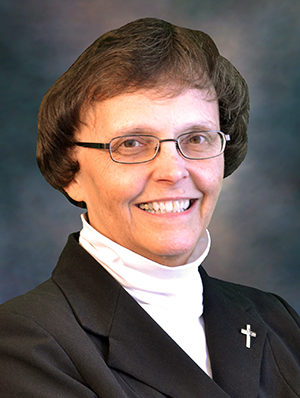
“If you want peace, work for justice”
Sister Joyce Lehman • President, Sisters of the Precious Blood
Years ago, 1971 to be precise, Blessed Pope Paul VI in his New Year’s Day Peace message to the world proclaimed: “If you want peace, work for justice.”
He was attempting to highlight that if our work to bring about peace on earth does not build on a just society, it is work for naught. Justice, he goes on to explain, is founded in a deep respect for each human person, and for the right relationships that allow human beings to work alongside each other with regard for each one’s dignity, with value for each one’s rights and with an appreciation for the variety of gifts each one brings.
We realize that the plagues of division, prejudice, hatred and exclusion stand no chance when our relationships with each other, with God and with God’s creation are built on the understanding that all life is an unearned gift from God and that all life is sacred. We have only to look around us to know that in so many areas we do not have real peace. We may have a lack of war, but we do not have the lasting peace that is of God’s reign. We recognize that we are not in right relationship with each other when an accent or language, the color of one’s skin or the texture of one’s hair, the manner in which one dresses or carries oneself, when food or customs or country of origin drive a wedge between us rather than unite us in sacred curiosity, respect and appreciation. There is no peace because there is no justice, but rather suspicion, fear, rejection and exclusion.
The Second Vatican Council called the Eucharist the source and summit of our lives. In the Eucharist we also find the source for a just world. The Eucharistic banquet is the table of unity, a place where we are welcomed regardless of how we look or speak or dress, whether we are rich or poor, or what we do in life. Our relationship with others is formed not in liking or disliking but in the spiritual foundation of the Body and Blood of Jesus who died that all might be saved. It is not only at the altar table that we need to practice acceptance. At the end of the liturgy we are sent forth strengthened by the Word we have heard and by Jesus’ Body and Blood, to reach across borders and boundaries, to go beyond likes and dislikes, to welcome and embrace those who find themselves on the margins or excluded from our circle of the people we are willing to accept. We are called not only to receive Eucharist but to become Eucharist for others.
When we open our eyes to see with the eyes of Jesus, we can see where the world is out of order, where relationships are fractured and where the virtue of justice is needed. And the starting place for justice is “just us” working in our families, our workplaces, our communities and our churches, wherever people are together and interact. Curiosity about dissimilarities, respect for differences, and appreciation for something other than what we know can help us build that just relationship that reflects the unity that Eucharist calls us to be. And peace can only follow.





